I've recently joined a company that for security reasons doesn't allow their source code on laptops. Development happens strictly on workstations inside their private networks, with some using their text editor's support for remote file editing and others running editors on those machines via SSH.
Adapting to this situation has indirectly led me into a bit of a rabbit hole, forcing me to acknowledge my core values, better understand the relation between progress and human flourishing, and ponder about the question: why technology?
(Chapters are mostly self-contained.)
Part One: A Lispy Adventure

Source: Arun Chanchal
Table of Contents
The computing experience
One of the oldest pieces of software still in use was recently described as
A sort of hybrid between Windows Notepad, a monolithic-kernel operating system, and the International Space Station.
Of course, they were talking about Emacs. And yes, it is kinda true.
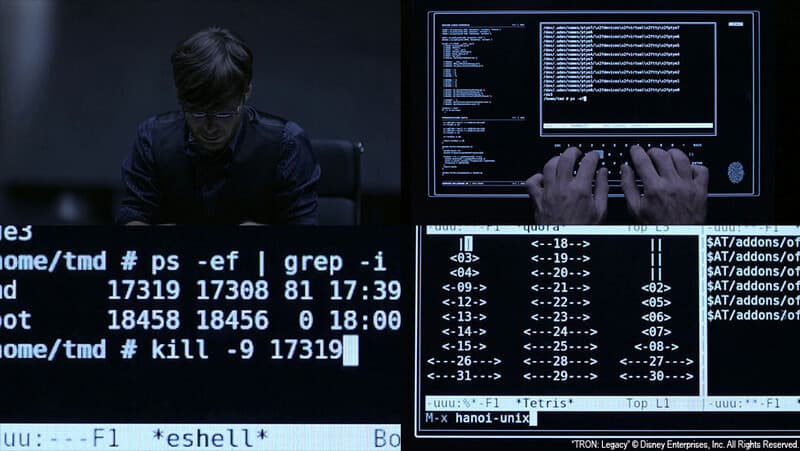
I've been using Emacs for a while and had opportunities to use it to work on
projects in remote machines. There are a few quirks, but after changing a
setting here and there,
Tramp
is mostly usable. Tramp makes it possible to transparently treat remote
directories, files, commands, and more, as if they were local. Opening a
remote buffer via M-x find-file /ssh:user@remote-host:/some/project and
having tools like Magit and Eshell work out of the box feels like magic.
Emacs runs either as a standalone graphical application (GUI) or in a terminal emulator (TUI). In terms of features, GUI Emacs can be seen as a superset of TUI Emacs. Among many other things, it makes it possible to display:
- images, PDFs, rendered web pages (even YouTube!)
- graphical popups (with code documentation, linting tips, compilation errors, completion candidates, etc.)
- heterogeneous fonts (distinct sizes, families, emphases, etc.)
For these and other reasons I use GUI Emacs and Tramp to work on remote projects instead of TUI Emacs via SSH. Some do the opposite, and that's fine too! Even with the limitations shown above, TUI Emacs is very powerful, and its performance in an SSH session is still superior to Tramp.
Even so, one might think displaying images in Emacs is not a big deal. Just
open image.png and get an actual image viewer application to render it, right?
Things get interesting in a remote Tramp buffer: M-x find-file image.png
will display the remote image right there in your local Emacs instance. Or
in case you're in a remote dired buffer, pressing RET on an image file will
do the same. It's a non-disruptive workflow that allows one to remain in the
comfort of Emacs.
If you're not an Emacs user, chances are the previous sentence doesn't carry much weight. What's good about staying inside Emacs?
It is safe to assume that most of your development, or more broadly, your computing environment is represented below:
- operating system (macOS, GNU/Linux distribution, Windows, etc.)
- window manager (the one provided by your OS, i3, Openbox, XMonad, etc.)
- terminal emulator (iTerm2, xterm, rxvt, alacritty, etc.)
- shell (bash, zsh, fish, etc.)
- terminal multiplexer (tmux, GNU Screen, etc.)
- text editor or IDE (Vim, VSCode, Xcode, IntelliJ IDEA, etc.)
- email, web browsing, multimedia, and communications
Each item above is a discrete computer program. They're extensible in disconnected ways, and to varying degrees. They're islands. Most of the time integrating them is an uphill battle, and commonly just plain impractical. Having used a computing environment centered around TUI Vim and tmux for a decade, I know the pain of trying to make the shell, the terminal, and every command line application running in it have the same look, feel, and behavior of being inside Vim. It is impossible.
In contrast, Emacs unifies and equalizes the computing experience as much as one desires, so that it happens—and is extended—in a single, cohesive environment.
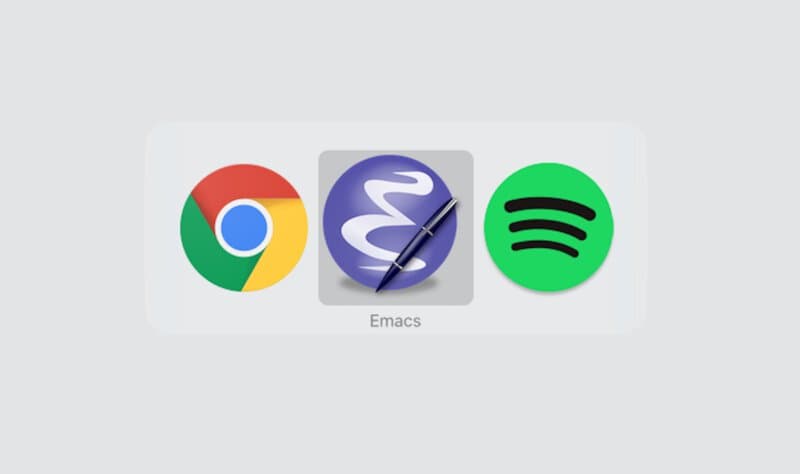
My computing environment.
People commonly use Emacs to process their email inbox, communicate in chat, navigate the web, write code, and prose. At their core, these activities are one and the same: text-editing. Being able to perform them using the same keybindings and functionality for movement, search, text manipulation, completion, undo-redo, copy-paste, is already a big deal, but it's not all: their integration into a single environment unlocks pleasant and efficient workflows that would be much less convenient elsewhere.
Creating a to-do item for something your partner just asked you (while you were concentrated on a task) that will show up automatically on your agenda tomorrow? Just a few keystrokes and you're back to the task. Converting some text notes you quickly scribbled down into a beautiful PDF via LaTeX, uploading it to S3, and referencing the URL in a reworded existing git commit message? If you're an experienced Emacs user, chances are you can visualize effortlessly and efficiently executing these actions without ever leaving Emacs.
This interconnectedness is part of the value of computing environments like the one provided by Emacs. The whole becomes greater than the sum of its parts.
Programmability gives it a further dimension of value: parts can be combined as you see fit, in arbitrary and possibly unforeseen ways.
Now, back to the displaying an image from a remote host use case. For that, I can think of some alternatives:
scpthe image file between hosts andopenit locally- Mount the remote filesystem and
openit locally sshinto the remote host from a modern terminal emulator capable of rendering images and use a program like icat
In Emacs, you just press enter.
Opening a file
At work I contribute to a moderately-sized monorepo at 70 thousand files,
8-digit lines of code and hundreds of PRs merged every day. One day I opened a
remote buffer at that repository and ran M-x find-file.
find-file is an interactive function that shows a narrowed list
of files in the current directory, prompts the user to filter and scroll
through candidates, and for a file to open.
Emacs froze for 5 seconds before showing me the find-file prompt. Which
isn't great, because when writing software, opening files is actually something
one needs to do all the time.
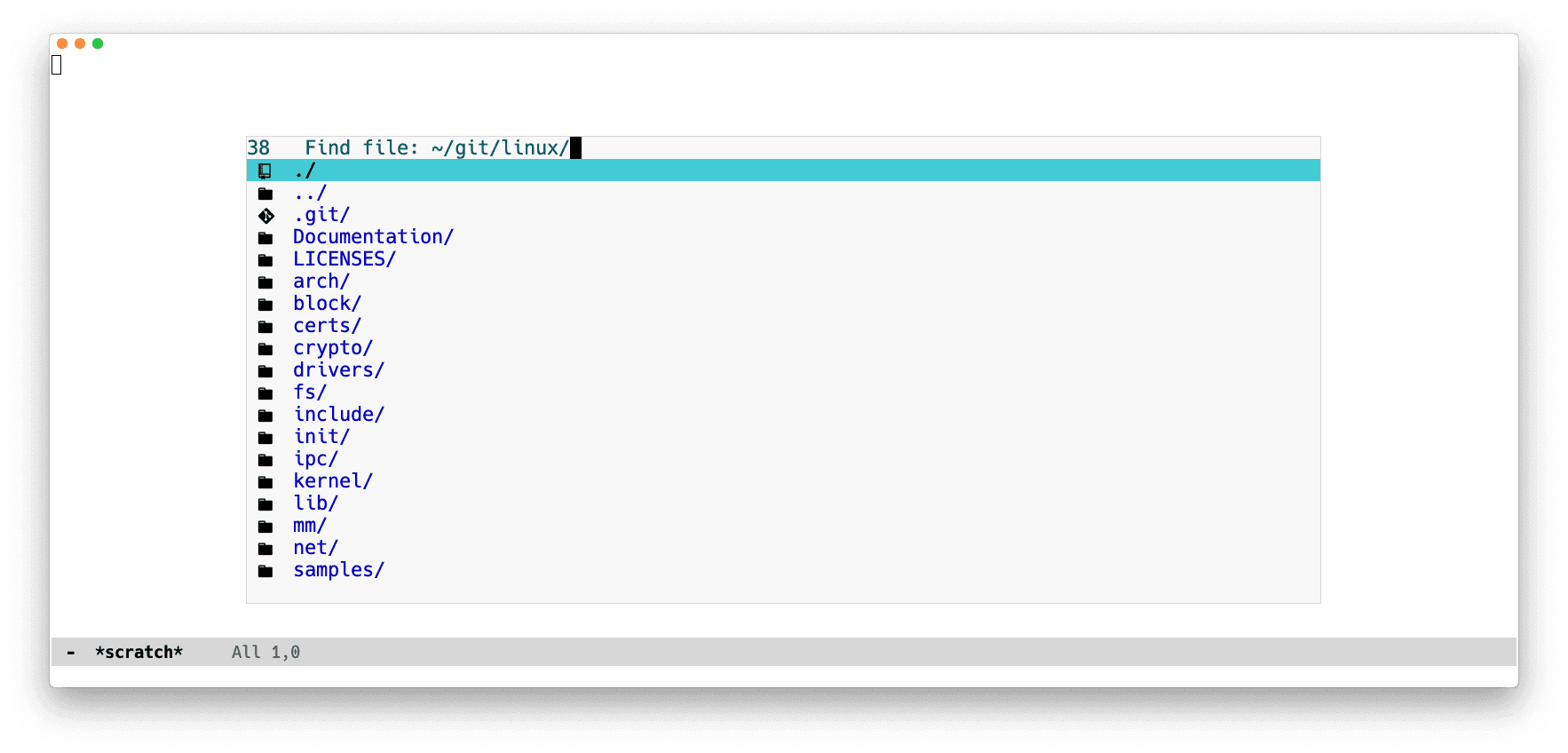
Luckily, Emacs is "the extensible, customizable, self-documenting real-time
display editor", and comes with profiling capabilities: M-x profiler-start
starts a profile and M-x profiler-report displays a call tree showing how much
CPU cycles are spent in each function call after starting the profile. Starting
a profile and running M-x find-file showed that all time was being spent in a
function called ffap-guess-file-name-at-point, which was being called by
file-name-at-point-functions, an
abnormal hook
run when find-file is called.
If you're familiar with Vim you can think of Emacs hooks as Vim autocommands, only with much better ergonomics.
I checked the documentation for ffap-guess-file-name-at-point with
M-x describe-function ffap-guess-file-name-at-point and it didn't seem to be
something essential, so I removed the hook by running M-x eval-expression,
writing the form below, and pressing RET.
(remove-hook 'file-name-at-point-functions 'ffap-guess-file-name-at-point)
This solved the immediate problem of Emacs blocking for 5 seconds every time I
ran find-file, with no noticeable drawbacks.
As I write this I attempt to reproduce the issue by re-adding
ffap-guess-file-name-at-point
to
file-name-at-point-functions.
I can't reproduce it anymore. The initial issue might have been
caused by having manually mutated the Emacs environment via ad-hoc code evaluation (drifting from the state defined in configuration)
caused by settings or packages that aren't in my configuration anymore
fixed by settings or packages that were recently added to my configuration
- fixed by some recent package upgrade
Or some combination of the above. I have no idea exactly what. Which is to say: maintaining Emacs configurations is complicated.
I could now navigate around and open files. The next thing I tried in this
remote git repository was searching through project files. The great
projectile package provides the projectile-find-file function for that, but
I had previously given up making projectile perform well with remote buffers;
given how things are currently implemented it seems to be
impractical. So I installed
the find-file-in-project package for use on remote projects exclusively:
M-x package-install find-file-in-project.
Both projectile-find-file and find-file-in-project (aliased as ffip):
- show a narrowed list of all project files in the minibuffer
- prompt the user to filter and scroll through candidates
- open a file when
RETis pressed on a candidate.
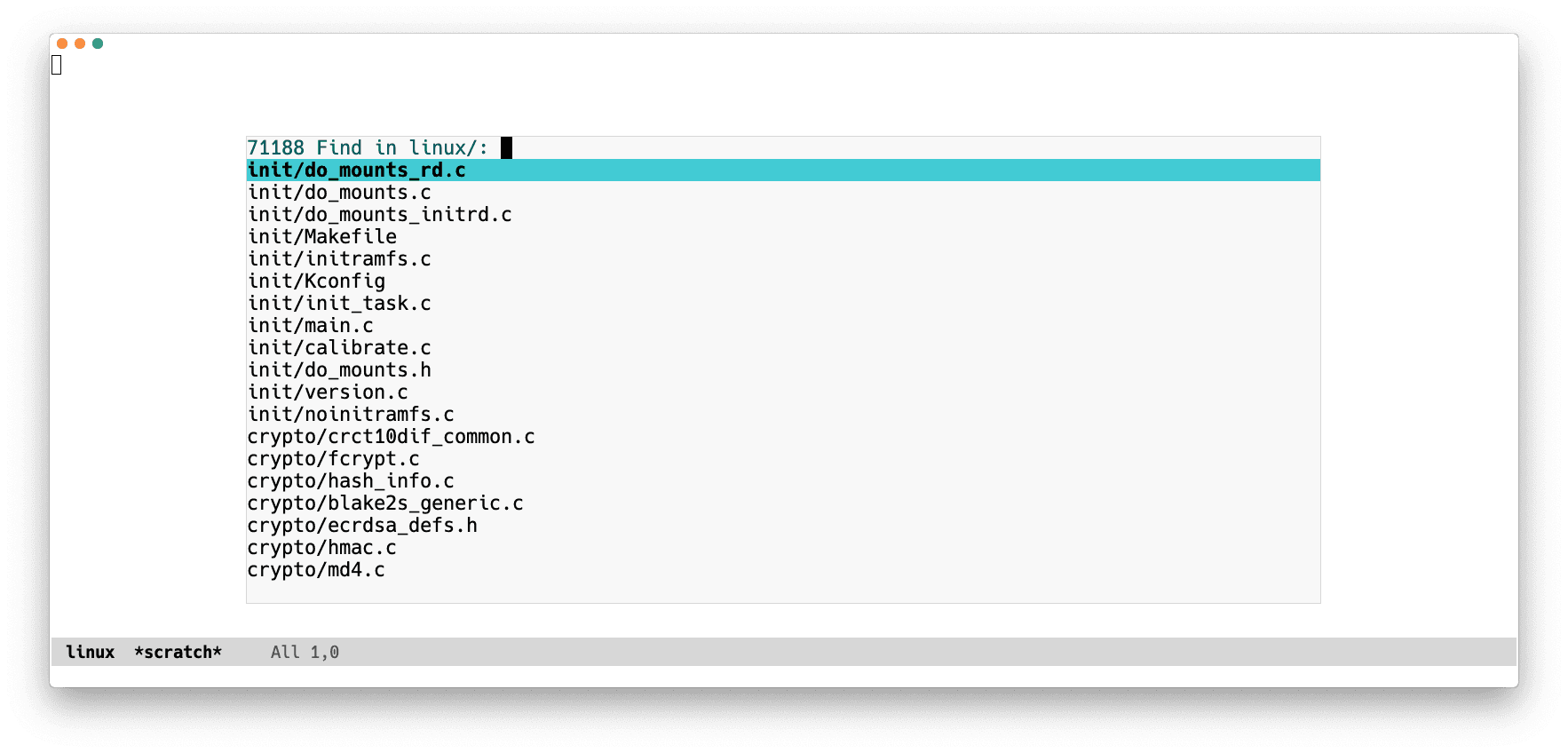
To disable projectile on remote buffers I had the following form in my configuration.
(defadvice projectile-project-root (around ignore-remote first activate)
(unless (file-remote-p default-directory 'no-identification) ad-do-it))
Which causes the projectile-project-root function to not run its usual
implementation on remote buffers, but instead return nil unconditionally.
projectile-project-root is used as a way to either get the project root for a
given buffer (remote or not), or as a boolean predicate to test if the buffer is
in a project (e.g., a git repository directory). Having it return nil on
remote buffers effectively disables projectile on remote buffers.
I then wrote a function that falls back to ffip when projectile is disabled
and bound it to the keybinding I had for projectile-find-file, so that I could
press the same keybinding whenever I wanted to search for projects files, and
not have to think about whether I'm on a remote buffer or not:
(apply 'max '(1 2))
(defun maybe-projectile-find-file ()
"Run `projectile-find-file' if in a project buffer, `ffip' otherwise."
(interactive)
(if (projectile-project-p)
(projectile-find-file)
(ffip)))
projectile-project-p uses projectile-project-root
internally.
And called it:
M-x maybe-projectile-find-file
Emacs froze for 30 seconds. After that, it showed the prompt with the narrowed list of files in the project. 30 seconds! What was it doing during the whole time? Let's try out the profiler again.
-
Start a new profile:
M-x profiler-start -
Call the function to be profiled:
M-x maybe-projectile-find-file(it freezes Emacs again for 30 seconds) -
And display the report:
M-x profiler-report
Which showed:
Function CPU samples %
+ ... 21027 98%
+ command-execute 361 1%
This tells us that 98% of the CPU time was spent in whatever ... is. Pressing
TAB on a line will expand it by showing its child function calls.
Function CPU samples %
- ... 21027 98%
+ ivy--insert-minibuffer 13689 64%
+ #<compiled 0x131f715d2b6fa0a8> 3819 17%
Automatic GC 2017 9%
+ shell-command 1424 6%
+ ffip-get-project-root-directory 77 0%
+ run-mode-hooks 1 0%
+ command-execute 361 1%
Expanding ... shows that Emacs spent 64% of CPU time in
ivy--insert-minibuffer and 9% of the time—roughly 3 whole seconds!—garbage
collecting. I had garbage-collection-messages set to t so I could already
tell that Emacs was GCing a lot; enabling this setting makes a message be
displayed in the echo area whenever Emacs garbage collects. I could also see the
Emacs process consuming 100% of one CPU core while it was frozen and
unresponsive to input.
profiler package implements a sampling profiler. The elp package can be used for getting actual wall clock times.Drilling down on #<compiled 0x131f715d2b6fa0a8> shows that cycles there (17%
of CPU time) were spent on Emacs waiting for user input, so we can ignore it for
now.
As I get deep in drilling down on ivy--insert-minibuffer, names in the
"Function" column start getting truncated because the column is too narrow. A
quick Google search (via M-x google-this emacs profiler report width) shows me
how to make it wider:
(setf (caar profiler-report-cpu-line-format) 80
(caar profiler-report-memory-line-format) 80)
Describing those variables with M-x describe-variable shows that the default
values are 50.
From the profiler report buffer I run M-x eval-expression, paste the form
above with C-y and press RET. I also persist this form to my configuration.
Pressing c in the profiler report buffer (bound to
profiler-report-render-calltree) redraws it, now with a wider column, allowing
me to see the function names.
Here is the abbreviated expanded relevant portion of the call stack.
Function CPU samples %
- ffip 13586 63%
- ffip-find-files 13586 63%
- let* 13586 63%
- setq 13585 63%
- ffip-project-search 13585 63%
- let* 13585 63%
- mapcar 13531 63%
- #<lambda 0xb210342292> 13528 63%
- cons 13521 63%
- expand-file-name 12936 60%
- tramp-file-name-handler 12918 60%
- apply 9217 43%
- tramp-sh-file-name-handler 9158 42%
- apply 9124 42%
- tramp-sh-handle-expand-file-name 8952 41%
- file-name-as-directory 5812 27%
- tramp-file-name-handler 5793 27%
+ tramp-find-foreign-file-name-handler 3166 14%
+ apply 1237 5%
+ tramp-dissect-file-name 527 2%
+ #<compiled -0x1589d0aab96d9542> 337 1%
tramp-file-name-equal-p 312 1%
tramp-tramp-file-p 33 0%
+ tramp-replace-environment-variables 6 0%
#<compiled 0x1e202496df87> 1 0%
+ tramp-connectable-p 1006 4%
+ tramp-dissect-file-name 628 2%
+ eval 517 2%
+ tramp-run-real-handler 339 1%
+ tramp-drop-volume-letter 60 0%
tramp-make-tramp-file-name 30 0%
+ tramp-file-name-for-operation 40 0%
+ tramp-find-foreign-file-name-handler 2981 13%
+ tramp-dissect-file-name 518 2%
tramp-tramp-file-p 34 0%
#<compiled 0x1e202496df87> 1 0%
+ tramp-replace-environment-variables 1 0%
+ replace-regexp-in-string 153 0%
+ split-string 15 0%
+ ffip-create-shell-command 4 0%
cond 1 0%
A couple of things to unpack here. From lines 8-11 it could deduced that ffip
maps a lambda that calls expand-file-name over all completion candidates,
which in this case are around 70 thousand file names. Running
M-x find-function ffip-project-search and narrowing to the relevant region in
the function shows
exactly that:
find-function shows the definition of a given function, in its source file.find-file-in-project.el(mapcar (lambda (file)
(cons (replace-regexp-in-string "^\./" "" file)
(expand-file-name file)))
collection)
On line 11 of the profiler report we can see that 60% of 30 seconds (18 seconds)
was spent on expand-file-name calls. By dividing 18 seconds by 70000 we get
that expand-file-name calls took 250µs on average. 250µs is how long a modern
computer takes to
read 1MB sequentially from RAM! Why
would my computer need to do that amount of work 70000 times just to display a
narrowed list of files?
Let's see if the function documentation for expand-file-name provides any
clarity.
M-x describe-function expand-file-nameexpand-file-name is a function defined in C source code.
Signature
(expand-file-name NAME &optional DEFAULT-DIRECTORY)
Documentation
Convert filename NAME to absolute, and canonicalize it.
Second arg DEFAULT-DIRECTORY is directory to start with if NAME is relative
(does not start with slash or tilde); both the directory name and
a directory's file name are accepted. If DEFAULT-DIRECTORY is nil or
missing, the current buffer's value of default-directory is used.
NAME should be a string that is a valid file name for the underlying
filesystem.
Ok, so it sounds like expand-file-name essentially transforms a file path into
an absolute path, based on either the current buffer's directory or optionally,
a directory passed in as an additional argument. Let's try evaluating some forms
with M-x eval-expression both on a local and a remote buffer to get a sense of
what it does.
In a local dired buffer at my local home directory:
*dired /Users/mpereira @ macbook*(expand-file-name "foo.txt")
;; => "/Users/mpereira/foo.txt"
In a remote dired buffer at my remote home directory:
*dired /home/mpereira @ remote-host*(expand-file-name "foo.txt")
;; => "/ssh:mpereira@remote-host:/home/mpereira/foo.txt"
The expand-file-name call in ffip-project-search doesn't specify a
DEFAULT-DIRECTORY (the optional second parameter to expand-file-name) so
like in the examples above it defaults to the current buffer's directory, which
in the profiled case is a remote path like in the second example above.
With a better understanding of what expand-file-name does, let's now try to
understand how it performs. We can benchmark it with benchmark-run in local
and remote buffers, and compare their runtimes.
M-x describe-function benchmark-runbenchmark-run is an autoloaded macro defined in benchmark.el.gz.
Signature
(benchmark-run &optional REPETITIONS &rest FORMS)
Documentation
Time execution of FORMS.
If REPETITIONS is supplied as a number, run forms that many times,
accounting for the overhead of the resulting loop. Otherwise run
FORMS once.
Return a list of the total elapsed time for execution, the number of
garbage collections that ran, and the time taken by garbage collection.
Benchmarking it in a local dired buffer at my local home directory
*dired /Users/mpereira @ macbook*(benchmark-run 70000 (expand-file-name "foo.txt"))
;; => (0.308712 0 0.0)
and in a remote dired buffer at my remote home directory
*dired /home/mpereira @ remote-host*(benchmark-run 70000 (expand-file-name "foo.txt"))
;; => (31.547211 0 0.0)
showed that it took 0.3 seconds to run expand-file-name 70 thousand times on a
local buffer, and 30 seconds to do so on a remote buffer: two orders of
magnitude slower. 30 seconds is more than what we observed in the profiler
report (18 seconds), and I'll attribute this discrepancy to unknowns; maybe the
ffip execution took advantage of byte-compiled code evaluation, or there's
some overhead associated with benchmark-run, or something else entirely.
Nevertheless, this experiment clearly corroborates the profiler report results.
So! Back to ffip. Looking again at the previous screenshot, it seems that the
list of displayed files doesn't even show absolute file paths. Why is
expand-file-name being called at all? Maybe calling it isn't too important...

Let's remove the expand-file-name call by
- visiting the
ffip-project-searchfunction in the library file withM-x find-function ffip-project-search - "raising"
filein the lambda - re-evaluating
ffip-project-searchwithM-x eval-defun
and see what happens.
find-file-in-project.el(mapcar (lambda (file)
(cons (replace-regexp-in-string "^\./" "" file)
- (expand-file-name file)))
+ file))
collection)
I run my function again:
M-x maybe-projectile-find-file
It's faster. This change alone reduces the time for ffip to show the candidate
list from 30 seconds to 8 seconds with no noticeable drawbacks. Which is
better, but still not even close to acceptable.

Profiling the changed function shows that now most of the time is spent in
sorting candidates with ivy-prescient-sort-function, and garbage collection.
Automatic sorting of candidates based on selection recency comes from the
excellent ivy and ivy-prescient packages, which I had installed and
configured. Disabling ivy-prescient with M-x ivy-prescient-mode and
re-running my function reduces the time further from 8 seconds to 4 seconds.
Another thing I notice is that ffip allows
fd to be used as a backend instead of GNU
find. fd claims to have better performance, so I install it on the remote host
and configure ffip to use it. I evaluate the form below like before, but I
could also have used the very handy M-x counsel-set-variable, which shows a
narrowed list of candidates of all variables in Emacs (in my setup there's
around 20 thousand) along with a snippet of their docstrings, and on selection
allows the variable value to be set. Convenient!
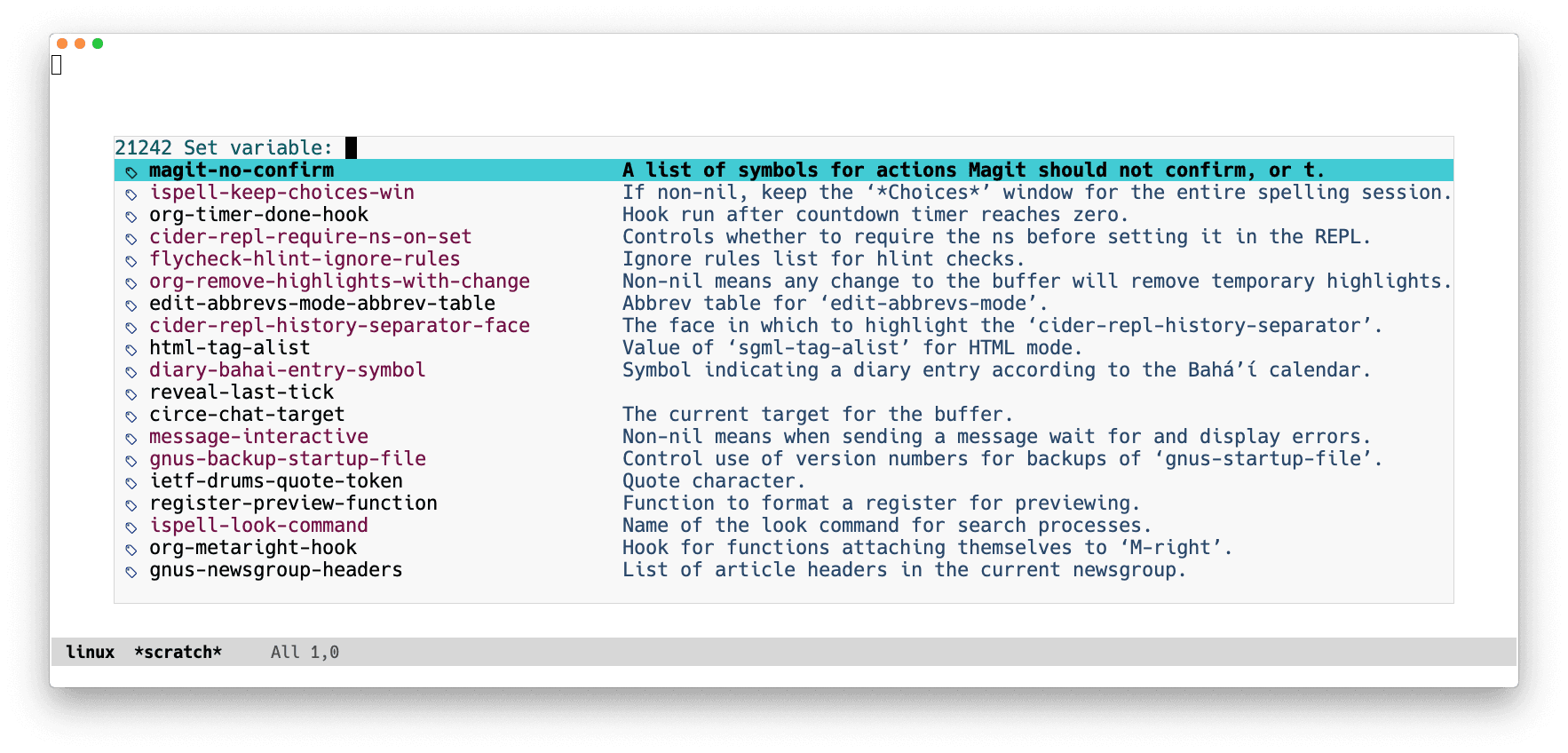
(setq ffip-use-rust-fd t)
Which brings my function's runtime to a little over 2 seconds—a 15x performance improvement overall—achieved via:
- Manually evaluating a modified function from an installed library file
- Disabling useful functionality (prescient sorting)
- Installing a program on the remote host and configuring
ffipto use it
The last point is not really an issue, but the whole situation is not ideal. Even putting aside all of the above points, I don't want to wait for over 2 seconds every time I search for files in this project.
Let's see if we can do better than that.
So far we've been mostly configuring and introspecting Emacs. Let's now extend it with new functionality that satisfies our needs.
We want a function that:
- Based on a remote buffer's directory, figures out its remote project root directory
- Runs
fdon the remote project root directory - Presents the output from
fdas a narrowed list of candidate files, with it being possible to filter, scroll, and select a candidate from the list - Has good performance and is responsive even on large, remote projects
Let's see if there's anything in find-file-in-project that we could reuse. I
know that ffip is figuring out project roots and running shell commands
somehow. By checking out its library file with
M-x find-library find-file-in-project (which opens a buffer with the
installed find-file-in-project.el package file) I can see that the
shell-command-to-string function (included with Emacs) is being used for
running shell commands, and that there's a function named ffip-project-root
that sounds a lot like what we need.
I have a keybinding that shows the documentation for the thing under the cursor. I use it to inspect the two functions:
ffip-project-rootffip-project-root is an autoloaded function defined in
find-file-in-project.el.
Signature
(ffip-project-root)
Documentation
Return project root or default-directory.
shell-command-to-stringshell-command-to-string is a compiled function defined in
simple.el.gz.
Signature
(shell-command-to-string COMMAND)
Documentation
Execute shell command COMMAND and return its output as a string.
Perfect. We should be able to reuse them.
I also know that the ivy-read function provided by ivy should take care of
displaying the narrowed list of files. Looks like we won't need to write a lot
of code.
To verify that our code will work on remote buffers we'll need to evaluate forms
in the context of one. The with-current-buffer macro can be used for that.
M-x describe-function with-current-bufferwith-current-buffer is a macro defined in subr.el.gz.
Signature
(with-current-buffer BUFFER-OR-NAME &rest BODY)
Documentation
Execute the forms in BODY with BUFFER-OR-NAME temporarily current.
BUFFER-OR-NAME must be a buffer or the name of an existing buffer.
The value returned is the value of the last form in BODY. See
also with-temp-buffer.
For writing our function, instead of evaluating forms ad-hoc with
M-x eval-expression, we'll open a scratch buffer and write and evaluate
forms directly from there, which should be more convenient.
I have a clone of the Linux git repository
on my remote host. Let's assign a remote buffer for the officially funniest file
in the Linux kernel, jiffies.c—
/ssh:mpereira@remote-host:/home/mpereira/linux/kernel/time/jiffies.c
—to a variable named remote-file-buffer by evaluating the following form with
eval-defun.
*scratch*(setq remote-file-buffer
(find-file-noselect
(concat "/ssh:mpereira@remote-host:"
"/home/mpereira/linux/kernel/time/jiffies.c")))
;; => #<buffer jiffies.c>
Notice that the buffer is just a value, and can be passed around to functions.
We'll use it further ahead to emulate evaluating forms as if we had that
buffer opened, with the with-current-buffer macro.
Let's start exploring by writing to the *scratch* buffer and continuing to
evaluate forms one by one with eval-defun.
*scratch*(shell-command-to-string "hostname")
;; => "macbook"
default-directory
;; => "/Users/mpereira/.emacs.d/
(ffip-project-root)
;; => "/Users/mpereira/.emacs.d/
And now let's evaluate some forms in the context of a remote buffer. Notice that
running hostname in a shell returns something different.
*scratch*(with-current-buffer remote-file-buffer
(shell-command-to-string "hostname"))
;; => "remote-host"
(with-current-buffer remote-file-buffer
default-directory)
;; => "/ssh:mpereira@remote-host:/home/mpereira/linux/kernel/time/"
(with-current-buffer remote-file-buffer
(ffip-project-root))
;; => "/ssh:mpereira@remote-host:/home/mpereira/linux/"
(with-current-buffer remote-file-buffer
(shell-command-to-string "fd --version"))
;; => "fd 8.1.1"
(with-current-buffer remote-file-buffer
(executable-find "fd" t))
;; => "/usr/bin/fd"
executable-find requires the second argument to be non-nil to search on remote hosts. CheckM-x describe-function executable-find for more details.Emacs is not only running shell commands, but also evaluating forms as if it were running on the remote host. That's pretty sweet!
Now that we made sure that the executable for fd is available on the remote
host, let's try running some fd commands.
*scratch*(with-current-buffer remote-file-buffer
(shell-command-to-string "pwd"))
;; => "/home/mpereira/linux/kernel/time"
(with-current-buffer remote-file-buffer
(shell-command-to-string "fd --extension c | wc -l"))
;; => 28
(with-current-buffer remote-file-buffer
(shell-command-to-string "fd . | head"))
;; => Kconfig
;; Makefile
;; alarmtimer.c
;; clockevents.c
;; clocksource.c
;; hrtimer.c
;; itimer.c
;; jiffies.c
;; namespace.c
;; ntp.c
fd tells us that there are 28 C files in /home/mpereira/linux/kernel/time.
Let's see if we can get the project root, which would be /home/mpereira/linux.
*scratch*(with-current-buffer remote-file-buffer
(ffip-project-root))
;; => "/ssh:mpereira@remote-host:/home/mpereira/linux/"
That seems to work.
Let's now play with default-directory. This is a buffer-local variable that
holds a buffer's working directory. By evaluating forms with a redefined
default-directory it's possible to emulate being in another directory, which
could even be on a remote host. The code block below is an example of that—the
second form redefines default-directory to be the project root.
*scratch*(with-current-buffer remote-file-buffer
(shell-command-to-string "pwd"))
;; => "/home/mpereira/linux/kernel/time"
(with-current-buffer remote-file-buffer
(let ((default-directory (ffip-project-root)))
(shell-command-to-string "pwd")))
;; => /home/mpereira/linux
Nice!
I wonder how much Assembly and C are currently in the project.
*scratch*(with-current-buffer remote-file-buffer
(let ((default-directory (ffip-project-root)))
(shell-command-to-string "fd --extension asm --extension s --exec-batch cat '{}' | wc -l")))
;; => 373663
(with-current-buffer remote-file-buffer
(let ((default-directory (ffip-project-root)))
(shell-command-to-string "fd --extension c --extension h | xargs cat | wc -l")))
;; => 27088162
Twenty seven million, eighty eight thousand, one hundred and sixty two lines of C, and almost half a million lines of Assembly. It's fine.
Alright, at this point it feels like we have all the pieces: let's put them together.
*scratch*(defun my-project-find-file (&optional pattern)
"Prompt the user to filter, scroll and select a file from a list of all
project files matching PATTERN."
(interactive)
(let* ((default-directory (ffip-project-root))
(fd (executable-find "fd" t))
(fd-options "--color never")
(command (concat fd " " fd-options " " pattern))
(candidates (split-string (shell-command-to-string command) "\n" t)))
(ivy-read "File: "
candidates
:action (lambda (candidate)
(find-file candidate)))))
This is a bit longer than what we've been playing with, but even folks new to Emacs Lisp should be able to follow it:
- Redefine
default-directoryto be the project root directory (line 5) - Build, execute, and parse the output of the
fdcommand into a list of file names (lines 6-9) - Display a file prompt showing a narrowed list of all files in the project (lines 10-13)
Let's see if it works.
*scratch*(with-current-buffer remote-file-buffer
(my-project-find-file "jif"))
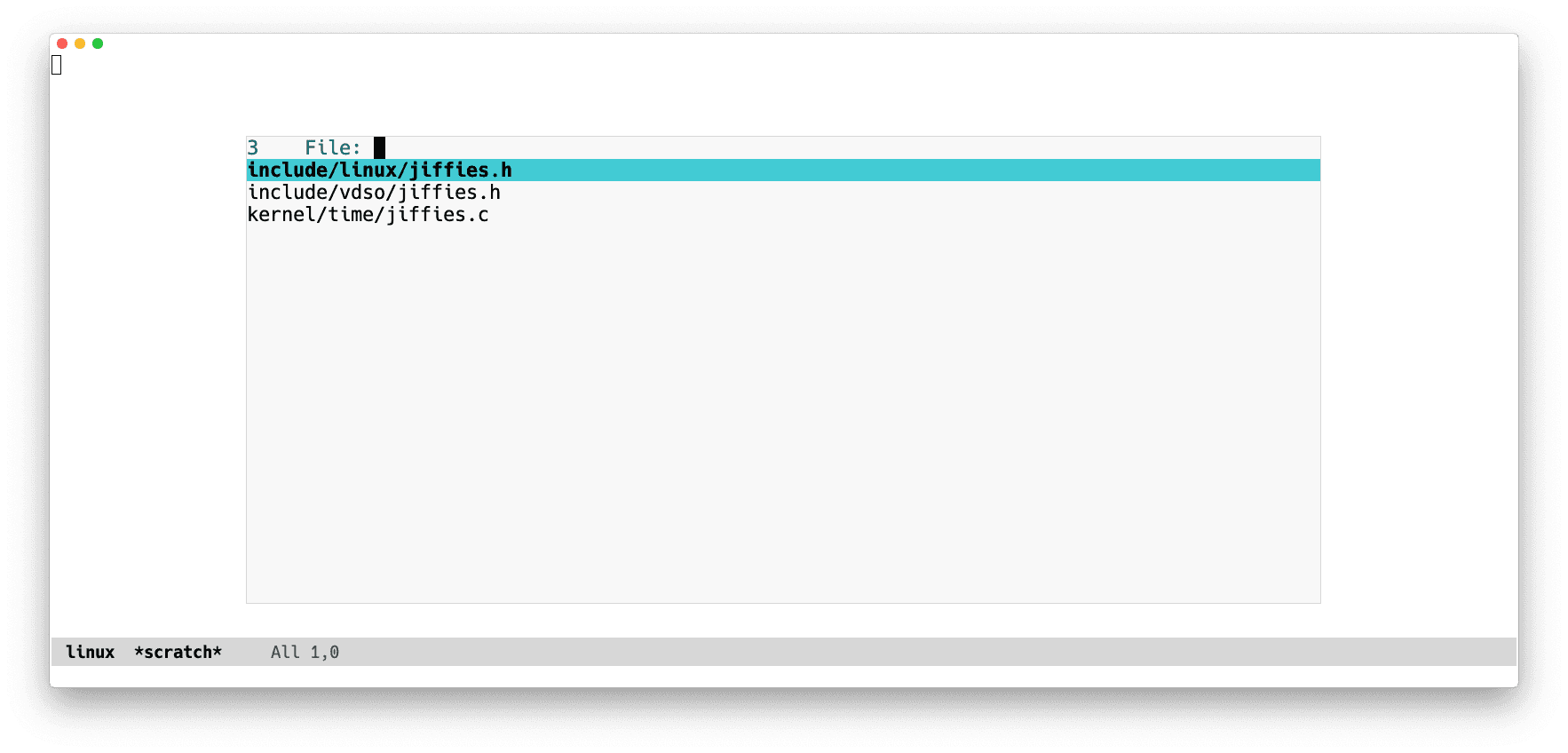
It does!
Since it was declared (interactive) we can also to call it via
M-x my-project-find-file.
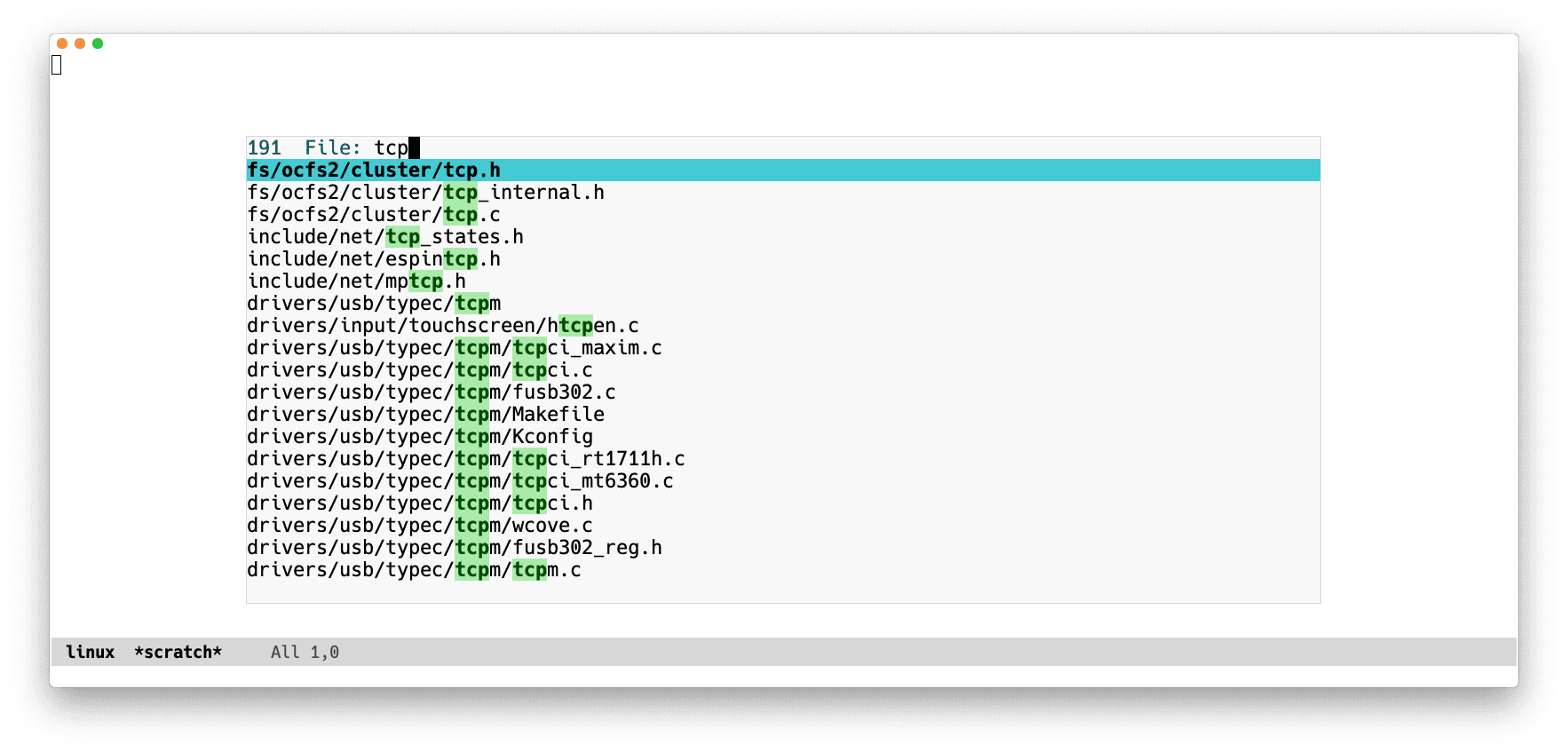
Going back to the large remote project and running my-project-find-file a few
times shows that it now runs in a little over a second—a 30x improvement
compared with what we started with.
This is still not good enough, so I went ahead and evolved the function we were working on to most of the time show something on screen immediately and redraw it asynchronously. You can check out the code at fast-project-find-file.el.
As an aside: having the whole text editor block for over a second while I wait for it to show something so simple is unacceptable. Through desensitization and acquiescence, we, users of software have come to expect that it will either not work at all, not work consistently, or exhibit poor or unpredictable performance.
Jonathan Blow addresses this situation somewhat entertainingly in "Preventing the Collapse of Civilization".
* * *
Did you notice how the function implementation came almost naturally from exploration? The immediate feedback from evaluating forms and modifying a live system—even though old news to Lisp programmers—is incredibly powerful. Combine it with an "extensible, customizable, self-documenting" environment and you have a very satisfying and productive means of creation.
Part Two: Computers, and Humans
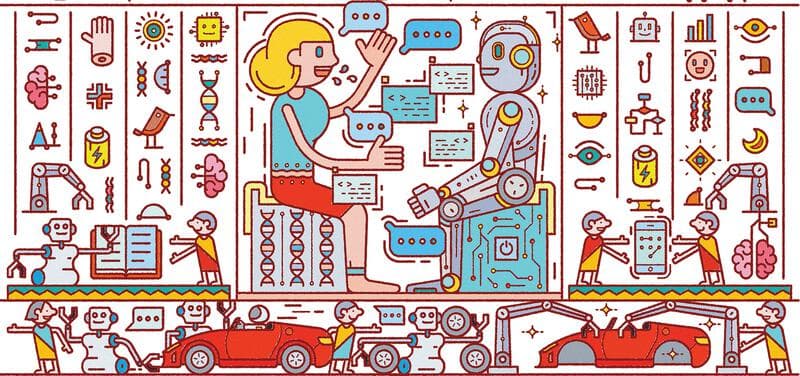
Source: Kuo Cheng Liao
The values of Emacs
In 2018 Bryan Cantrill gave a brilliant talk where he shared his recent experiences with the Rust programming language. More profoundly, he explored a facet of software that is oftentimes overlooked: the values of the software we use. To paraphrase him slightly:
Values are defined as expressions of relative importance. Two things that we're comparing could both be good attributes. The real question is, when you have to make a choice between two of them, what do you choose? That choice that you make, reflects your core values.
He goes ahead to contrast the core values of some programming languages with the core values we demand from systems software, like operating system kernels, file systems, microprocessors, and so on. It is a really good talk and you should watch it.
It is important to think about values because they are core to the decisions that we make.
Unlike systems software, the values demanded from text editors or IDEs vary greatly depending on who you ask. These are much more personal tools and make room for a diverse set of desires.
The following listing enumerates values that could be attributed to development tools.
| Value | Commentary |
|---|---|
| Approachability | Ease of getting started with for typical tasks, and contribution friendliness |
| Doing one thing well | Unix philosophy, fitting into an ecosystem |
| Editing efficiency | Fewer interactions, mnemonics, composable keystrokes, etc. |
| Extensibility | The degree to which behavior and appearance can be changed |
| Freedom | Embraces free software, rejects proprietary software |
| Integration | Cohesive core and concerted third-party functionality |
| Introspectability | Capable of being understood and inspected ad-hoc |
| Keyboard centrism | Focus on keyboard interactions |
| Maintainability | The degree to which it can be modified without introducing faults |
| Progressiveness | A measure of eagerness to make progress and leverage modern technology |
| Stability | Things that worked before continue to work the same way |
| Text centrism | Text as a universal interface |
| Velocity | Short and focused release cycles, aligned personpower, leveraging the community effectively |
Before we go any further, I'd like to point that out if you care about any of the topics discussed ahead you will likely strongly disagree with something or the other.
That's fine! We probably just have different values.
In my view, Emacs has the following core values:
Emacs
- Extensibility
- Freedom
- Introspectability
- Keyboard centrism
- Stability
- Text centrism
We can feel the clasp of stability in the following—rather poetic—exchange in the Emacs development mailing list, which also provides useful historical perspectives.
Emacs is older than the operating systems people use today. (It is almost as old as the first Unix, which barely resembled the Unix of later decades.) It is much older than Linux, the kernel.
The oldest design elements were not designed for the uses we make of them today. And since we wrote those, people have developed other areas of software which don't fit Emacs very well. So there are good reasons to redesign some of them.
However, people actually use Emacs, so a greatly incompatible change in Emacs is as unthinkable as a greatly incompatible change in the New York City subway.
We have to build new lines through the maze of underground pipes and cables.
— Richard Stallman in "Re: Discoverability (was: Changes for 28)" (2020)
The following exchange reifies freedom and stability while demonstrating a disinclination to progressiveness. Which is neither good nor bad; it's just what it is.
If Emacs was to become a "modern" app tomorrow, an editor extended in Lisp still only has appeal for a minority of programmers, much like the Lisp language itself. Most programmers looking for easy and modern experiences will likely stick with Atom and Sublime.
Most of the push for a "modern look" comes from the desire for Emacs to play more nicely with proprietary platforms. Rather, the goal of Emacs is to support platforms like GNU/Linux. Platforms that respect your freedom, and also do not push a corporate UI/UX vision of "modernity".
(Perhaps if we do move forward with modernization, we should think of modernization in the context of something like GNOME rather than MacOS or Windows. Surely Emacs could be a better citizen of GNOME.)
Given that many of the people complaining about "how Emacs looks" are not submitting patches to fix the problem themselves, resources would be diverted from actual functionality to "modernity".
By the time we do major code refactoring "modernizing" Emacs on the major proprietary platforms, what is "modern" has now once again changed, and our resources were put towards a project with a poor return on investment.
Basically, I don't see a "modernizing" project playing out well. We will spend extensive time and energy on a moving target, and even if we succeed, our Lisp-based vision still has limited appeal. Additionally, I don't think "modernizing" Emacs advances the cause of free software, given that there are other more popular casual libre tools for text editing that individuals can use.
Core values are self-reinforcing. They attract like-minded people, who will then defend them.
I'm an Emacs user, and reading the Emacs mailing lists serves to remind me that my values are very different from the values held by maintainers and core contributors. I don't value freedom or stability nearly as strongly and have an inner affinity for progressiveness and velocity.
* * *
Now let's talk about Vim. I see Vim as intersecting with a few of Emacs' values, but ultimately diverging radically with its narrow focus on providing really efficient editing capabilities.
Vim
- Doing one thing well
- Editing efficiency
- Keyboard centrism
- Stability
- Text centrism
One might notice that extensibility is not in the list. That's intentional. Vim is certainly extensible to a degree, but it just does not compare to Emacs. Vim has a "plugin system", while Emacs is the system. Your code becomes part of it the moment it's evaluated. Since I'm sticking to yes/no indicators for values I'm giving it a no.
Stability emanates from communications with the primary maintainer.
Vim development is slow, it's quite stable and still there are plenty of bugs to fix. Adding a new feature always means new bugs, thus hardly any new features are going to be added now. I did add a few for Vim 7.3, and that did introduce quite a few new problems. Even though several people said the patch worked fine.
— Bram Moolenar in "Re: Scrolling screen lines, I knew, it's impossible." (2011)
And of course in this famous exchange in a QA session.
How can the community ensure that the Vim project succeeds for the foreseeable future?
Keep me alive.
— Bram Moolenaar in "10 Questions with Vim's creator" (2014)
At the end of 2013, a few folks were trying to get new concurrency primitives merged into Vim. This would empower plugin authors to create entirely new types of functionality and by extension, make Vim better.
This is what one of them had to say about the process:
The author of Neovim (Thiago de Arruda) tried to add support for multi-threaded plugins to Vim and has been stymied.
I'm not sure how to get a patch merged into Vim. Bram Moolenar is the only person with commit access, and he's not a fan of most changes beyond bug fixes. My co-founder and I tried to add setTimeout & setInterval to vimscript. Even six weeks of full-time effort and bending over backwards wasn't enough. Eventually we were just ignored.
I've contributed to a lot of open source projects, and the Vim community has been the most difficult to work with. I've been writing C for almost two decades, and the Vim codebase is the worst C I've ever seen. The project is definitely showing its age, and I'd love for something new to replace it.
While they understood that some of their values were ultimately incompatible with the values of the Vim maintainers—who prioritized stability—they still tried to push for a change, because they treasured the idea of Vim, embodied by some of its values.
It didn't happen, so a Vim fork came to life: Neovim.
The vision was grand, and is summarized in a statement of its values:
Neovim is a Vim-based text editor engineered for extensibility and usability, to encourage new applications and contributions.
Some of their concrete plans included
- improving testing, tooling, and CI to simplify maintenance, make aggressive refactorings possible, and greatly reduce contributor friction
- decoupling the core from the UI, making it possible to embed the Vim core into browsers or IDEs (or any computer program really), also making way for more powerful and diverse GUIs
- embedding a Lua runtime and providing concurrency primitives to open the doors for smoother, more efficient, and powerful plugins
- extensive refactoring: bringing C code to modern standards (C99, leveraging new compiler features), replacing platform-specific IO code with libuv, removing support for legacy systems and compilers, including automatic formatting, and fixing static analysis warnings and errors
- creating a scriptable terminal emulator
And they delivered it.
In a very short amount of time they were able to, and I don't use this word lightly, revolutionize Vim. The impact can be seen in Vim development, which picked up considerably as Neovim gained ground, with features and processes ending up being reimplemented in Vim.
And they aren't stopping there. Current plans include:
- translating all Vimscript to Lua under the hood, increasing execution performance due to leveraging LuaJIT, a very, very fast runtime
- shipping a built-in LSP client
Neovim builds upon Vim, and the way I see it, holds the following core values:
Neovim
- Approachability
- Editing efficiency
- Extensibility
- Keyboard centrism
- Progressiveness
- Text centrism
- Velocity
As I see it, it also currently has a better story than Emacs on:
- development process: non-mailing-list-driven-development, extensive automated builds, a public roadmap, recurrent funding, frequent stable, automated releases
- user interface: all UI-related code for every single platform was removed from the core, replaced by a consistent API (both TUIs and GUIs use it) that made a diversity of decoupled display implementations possible (UIs are literally plugins!)
- out of the box experience: better defaults, built-in LSP client
These items are the outcome of massive change that came about through consistent hard work from a few individuals who shared a vision and a set of values. Crucially, it included aggressively improving the human side of software: raising money to support development, lowering contribution friction, unblocking contributors, reconciling and combining efforts, documenting processes. In other words, the type of invaluable work non-software engineers do in technology companies. To our detriment, in open source these tasks are often neglected.
Code is the easy part of building software.
It's hard to contest that Neovim's achievement happened because of its approachable development process focused on maintainability and velocity, while in contrast, it could be argued that current progress in Emacs happens despite its development process.
For example, because Emacs highly values freedom, contributing to Emacs core (or to packages in the official repository) requires assigning copyright to the FSF. To incorporate packages into the main repository, everyone who committed to the project needs to have gone through that procedure. Even in the case of a very willing, actual core Emacs maintainer, of an uncontroversially valuable package used by virtually everyone, this process can take years.
It also makes it impossible for some to contribute to Emacs. Check out this lively discussion about Emacs copyright assignment on Reddit for more context.
It is also not hard to find criticism coming from folks who have already and continue to give so much to the community and ecosystem.
It all comes down to core values.
* * *
Let's now address the 800-pound gorilla in the room: VSCode.
VSCode was released just five years ago, and in this short amount of time it was able to capture half of the world's software developers.
It provides a powerful, refined, cohesive out of the box experience with great performance.
It has immense leverage by building on top of Electron, NodeJS, and Chromium, projects that receive contributions in the millions of person-hours of work, from both the open source community and heavily invested corporations.
Here's how I see its values.
VSCode
- Approachability
- Integration
- Maintainability
- Progressiveness
- Velocity
We can now put it all together in this very uncontroversial table.
| Value | Emacs | Vim | Neovim | VSCode |
|---|---|---|---|---|
| Approachability | ✓ | ✓ | ||
| Doing one thing well | ✓ | |||
| Editing efficiency | ✓ | ✓ | ||
| Extensibility | ✓ | ✓ | ||
| Freedom | ✓ | |||
| Integration | ✓ | |||
| Introspectability | ✓ | |||
| Keyboard centrism | ✓ | ✓ | ✓ | |
| Maintainability | ✓ | |||
| Progressiveness | ✓ | ✓ | ||
| Stability | ✓ | ✓ | ||
| Text centrism | ✓ | ✓ | ✓ | |
| Velocity | ✓ | ✓ |
Irrespective of values, VSCode is looking more and more as an acceptable Emacs replacement.
- It is somewhat extensible and very configurable
- It can be mostly driven from a keyboard
- It has a great extension language, TypeScript (which is in my opinion superior to Emacs Lisp in terms of maintainability for non-trivial projects)
- It even has a libre variant
It also shines in areas where Emacs doesn't: if you're a programmer working on typical contemporary projects, mostly just wanting to get stuff done, things usually... just work. You install VSCode, open a source code file, get asked to install the extension for that particular language, and that's it. You get smart completion, static analysis, linting, advanced debugging, refactoring tools, deep integration with git, and on top of that, great performance and a cohesive user experience.
Ironically, LSP (originally developed by Microsoft for VSCode) is one of the main things bringing not only progressiveness and approachability but also integration to Emacs.
This type of experience is the selling point of Doom and Spacemacs, two initiatives driven by relentless maintainers. These projects bring approachability and integration to Emacs, and are in my view, along with LSP, Magit, and Org, the biggest reasons drawing people to Emacs nowadays. It is however clear from looking at their issue trackers just how difficult it is to provide this cohesive experience by combining parts from the ecosystem.
Since Emacs is so malleable, it is very easy for packages to interfere with one another, depend on functionality from other packages that get deprecated, changed in incompatible ways, or removed. There's currently no way for a package to depend on a specific version of another package, or for multiple versions of a single package to be loaded at the same time, for example.
With Neovim also shaping up as a worthwhile up-and-comer, this is probably the first time Emacs has actual competition in its own turf.
In "Emacs is my "favourite Emacs package"" Protesilaos Stavrou talks about the importance of Emacs, the platform. While Emacs packages can be valuable in isolation, combined, they amplify the platform that made them possible. The whole becomes greater than the sum of its parts.
It wouldn't be a stretch to say that Org represents 10% of my cognitive function. Magit really is "Git at the speed of thought", and I have yet to see a more integrated and rich interactive shell than Eshell.
And yet, even being a very enthusiastic Emacs user, I have a hard time recommending it to folks who mostly just want to get stuff done. Some will argue that those who aren't willing to build their computing environment from scratch shouldn't be using a "power tool" like Emacs anyway. I don't see a fundamental reason for that to be the case, and believe that not having young folks trying out, using, and contributing to Emacs, is not a good thing for Emacs.
This existential threat seems to be acknowledged by maintainers.
One of the gravest problems I see for the future of Emacs development is that we slowly but steadily lose old-timers who know a lot about the Emacs internals and have lots of experience hacking them, whereas the (welcome) newcomers mostly prefer working on application-level code in Lisp. If this tendency continues, we will soon lose the ability to make deep infrastructure changes, i.e. will be unable to add new features that need non-trivial changes on the C level.
— Eli Zaretskii in Re: [PATCH] Add prettify symbols to python-mode (2015)
For better or worse, Emacs overfits to the needs and priorities of its maintainers, and contributors who overcome its barriers to entry. Being a decentralized, volunteer-based project, people will commonly scratch their own itches or work on whatever they find interesting. Which is only fair: they could be doing literally anything else, and yet they choose to sacrifice their time and do their best to advance Emacs according to their values. They owe no one anything and deserve gratitude.
* * *
In a 2015 keynote, while laying out an argument for why the Go programming language is open source at all, Russ Cox portrayed an active and intentional effort to lower barriers to entry and deliberately improve the human side of Go, so that as many people as possible used and contributed to it.
The core values of Go are incidentally made apparent through the talk:
- Approachability
- Developer productivity
- Large-scale development
- Performance
- Simplicity
Go was created to make Google's developers more productive and give the company a competitive advantage by being able to build products faster and maintain them more easily. Why share it with the world?
Russ argues that the business justification for it is that it is the only way that Go can succeed.
A language needs large, broad communities.
A language needs lots of people writing lots of software, so that when you need a particular tool or library, there's a good chance it has already been written, by someone who knows the topic better than you, and who spent more time than you have to make it great.
A language needs lots of people reporting bugs, so that problems are identified and fixed quickly. Because of the much larger user base, the Go compilers are much more robust and spec-compliant than the Plan 9 C compilers they're loosely based on ever were.
A language needs lots of people using it for lots of different purposes, so that the language doesn't overfit to one use case and end up useless when the technology landscape changes.
A language needs lots of people who want to learn it, so that there is a market for people to write books or teach courses, or run conferences like this one.
None of this could have happened if Go had stayed within Google. Go would have suffocated inside Google, or inside any single company or closed environment.
Fundamentally, Go must be open, and Go needs you. Go can't succeed without all of you, without all the people using Go for all different kinds of projects all over the world.
The parallel to Emacs isn't direct, but it's clear.
Emacs evolved greatly since its inception in 1976 as a collection of macros for the programmable TECO text editor, which is itself from 1962. Take a look at this example TECO program, from Wikipedia:
0uz
<j 0aua l
<0aub
qa-qb"g xa k -l ga -1uz '
qbua
l .-z;>
qz;>
It was a different world then. Updating the display text in real-time as users typed into the keyboard was a recent innovation.
Since then, Emacs Lisp was created, Emacs forks came and went, a graphical UI was added, lexical scope was implemented, rudimentary networking and concurrency primitives were introduced, and more.
It can be argued that stability and incremental evolution are the reasons why Emacs survived and is still thriving. Stability though is necessarily antithetical to progressiveness. The very thing that likely made it succeed is what slows it down.
It doesn't, however, affect progressiveness as much as freedom. Because of freedom, when faced with a question of using technology that is
- Non-free, but objectively better
- Free, but objectively worse
the latter will always be picked. Given that most technological progress happens through the mechanisms of capitalism, "free" alternatives commonly lag behind to a large degree.
Freedom has a price.
It can be seen clearly and succinctly in this exchange:
[...] I think freedom is more important than technical progress. Proprietary software offers plenty of technical "progress", but since I won't surrender my freedom to use it, as far as I'm concerned it is no progress at all.
If I had valued technical advances over freedom in 1984, instead of developing GNU Emacs and GCC and GDB I would have gone to work for AT&T and improved its nonfree software. What a big head start I could have got!
Agree with him or not, RMS has a point. The ability to inspect and change software running on our computing machines gives us control.
Apple for example seems to be growing increasingly antagonistic to the privacy of its users (and bullish to its developers). As I write this, it's been discovered that newer versions of macOS include anti-malware functionality that transmits tracking information almost every time any program is run. This information is sent unencrypted via a third-party CDN, so not only this could be seen as a privacy violation but also a dangerous data breach: anyone listening on the network can roughly know which applications you use, how often you use them, when do you use them, and from where.
There are measures that can still be taken to ameliorate this situation and others, but it's ultimately outside of our control. macOS is a proprietary operating system and can easily prevent users from taking these steps in the future.
I choose to pay the price of compromising my freedom by tolerating invasions of my privacy so that I can have a computer that mostly just works and allows me to be productive towards achieving my life goals. We have to pick our battles, and the hills we die on depend strongly on our values.
We are increasingly finding ourselves in a world where we have to choose between extremes: do you want a computing machine that respects your privacy, or a modern, powerful one?
* * *
Back to Emacs.
Maintainers and core contributors likely use it in very different ways than the majority of users and casual contributors and therefore have very different priorities. For example, until it got stolen in 2012, RMS used a 9-inch netbook because "it could run with free software at the BIOS level" (these days he uses an 11-year-old T400s). The recent Emacs User Survey 2020 might help identify prevailing usage patterns, and hopefully have an impact on the direction of Emacs.

Desire path (Alamy)
Emacs doesn't need a Neoemacs as much as Vim needed Neovim. Unlike Vim, Emacs always had a rich ecosystem of active contributors, and maintainers who—to some degree—listen to user feedback. There is still tension, rooted in ideology and values, which throughout Emacs history materialized as forks: Lucid/XEmacs, Guile Emacs, Aquamacs, Mac port, Remacs.
Forking is incredibly difficult to pull off. A successful one requires not only an initial momentum and enthusiasm, but also unrelenting, sustained hard work from a group of individuals, not to mention buy-in from a critical mass of users. As someone said to me, you have to be a "special kind of crazy" to start an Emacs fork.
I hope that Emacs doesn't find itself becoming "perfectly suited for a world that no longer exists". Still, I understand and appreciate the difficulty of the situation. People have diverging values and are highly fallible. Everything requires so much effort. So is our condition.
Ultimately, building software is a complex and deeply human activity. Everything is contextual and there are rarely easy answers. Most meaningful progress happens through consensus, compromise, luck, and lots of hard work.
In the end, a lot can be understood through the lens of values.
What are yours?
Cathedrals, Bazaars, and Fusion Reactors

Inside the Korean tokamak KSTAR (NFRI)
With corporations like Microsoft, Oracle, and Google truly reinventing themselves to adapt to an open source world, and typical open source projects moving towards—oftentimes centralized—governance models, the Cathedral-Bazaar dichotomy feels increasingly less relevant.
While being an entertaining piece of history with useful takeaways, its most important achievement was arguably helping create a sense of identity for hacker culture via the revolutionary Open Source movement, and promoting the value of the Internet for software development.
In the Cathedral-Bazaar continuum, contemporary projects like Kubernetes, Chromium, and VSCode are fusion reactors.
They have the backing of heavily invested companies with virtually infinite capital, who are able to staff highly competent teams that not only work full-time on these projects, but also have enough personpower to maximally leverage the benefits brought by a gigantic user base.
Like with fusion power, they seem to be able to leverage a high amount of energy to generate even more.
In contrast, the vast majority of open source projects depend almost exclusively on decentralized volunteer efforts from people sacrificing time out of their busy schedules and lives to move things forward.
And yet, projects following this style of development can end up becoming backbones of modern computing:
The OpenSSL project has been around since 1998. Since the project is open source, it is an informal group comprised primarily of about a dozen members throughout the world, most of whom have day jobs, and some of whom work on a volunteer basis. Being open source, the OpenSSL project's code has always been public facing. Any person could download it and modify it or implement it in their own software.
[...]
The fascinating, mind-boggling fact here is that you have this critical piece of network infrastructure that really runs a large part of the internet, and there's basically one guy working on it full time.
Heartbleed is a symptom of an ever-existing problem: corporations profit massively by leveraging typically under-resourced open source projects while not giving back proportionally, or (most commonly) at all; either with money or people.
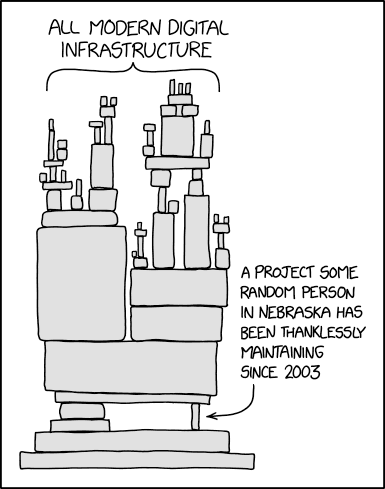
Less critical software like Emacs also follows this decentralized development style, and similarly, lacks resources.
So if Emacs wants to compete with these tools then it has to have seamless, context aware code completion and refactoring support, and GNU tools has to provide Emacs the necessary information to implement these features.
I agree. But to have that, the only way is to have motivated volunteers step forward and work on these features. Otherwise we will never have them.
Right now, no one is working on that, though everyone is talking. [T]he same as with weather.
One way to incentivize contributions is by funding developers. Some (most?) open source contributors would gladly take income to fund their work.
Long-term my big dream has always been to accumulate enough backing to be able to work full-time on open-source projects, but whether I'll achieve this dream or not is entirely up to you.
While others feel that accepting funding would degrade their intrinsic motivation to contribute.
I can't speak for all FLOSS developers, but I can speak for myself: I don't want monetary rewarding from users. Mainly for the reason, that I don't want to change the relationship with my users. Currently it is mostly a team attitude, we're working together to solve the problem. And there is also no legal obligation for me to work on something I don't like.
If I accepted contributions I think many users would get a "but I paid for that, so do what I want" attitude. I definitely don't want that. I do FLOSS in my free time to do something that matters, and for my personal fulfillment, not for money.
It will also get harder to do the right thing (in contrary to doing what the users want) since the users can stop the payments.
So, no payments for me, thanks.
— cjk101010 in "Sustainable Emacs development - some thoughts and analysis" (2017)
Which is fair: with compensation comes responsibility, timelines, expectations, and things can get complicated. From the point of view of the project, there doesn't seem to be a conflict: capture funding to enable those who need (or want) it, while still empowering those who don't, to contribute on their own terms.
Not everyone is in a position to spend unpaid time on open source, especially consistently. "Free" time isn't free—it costs life. By funding work, a project might get to see contributions from talented folks passionate about it who wouldn't be able to volunteer their time.
For Emacs specifically, one problem is that there's no clear way of funding "Emacs". Sending money to the FSF doesn't guarantee that it will fund Emacs development. Even if there was a way of "funding Emacs", the Emacs community—like many things in life—seems to be roughly divided in two sides: those who prioritize freedom, and those who prioritize progress. So one would potentially want to fund one side or the other, depending on their values.
In the excellent "Working in Public: The Making and Maintenance of Open Source Software", Nadia Eghbal calls attention to a shift in how individuals support open source. Similarly to platforms like Twitch, more and more people are funding creators directly instead of projects, as a way of "incentivizing the ongoing creation of creative work" from developers who produce things that are in their interests.
Maintainers of popular Emacs packages, for example, have their own separate streams of patronage, which receive varying levels of support depending on their popularity and the value added by what they create.
For efforts that involve multiple people, like maintaining and evolving Emacs itself, services like Open Collective could be of great assistance by helping on three fronts:
- providing a legal banking entity
- recurrently collecting funds from individuals and companies
- distributing funds to contributors
Funds can be transparently collected, and dispersed for specific contract work, infrastructure costs, and even developer salaries. Take for example the Babel project, which draws in enough recurrent income to finance multiple contractors and a full-time developer earning a San Francisco salary. An Emacs Open Collective could not only be an answer to "how can I fund Emacs development?" but also a way to financially support developers working on it.
GitHub Sponsors is another great example of developer empowerment. With it, not only does GitHub equip people to:
- be more productive by providing great code hosting, bug tracking, wiki, code reviewing and merging, project management, continuous integration, documentation, artifact hosting, etc.
- have a broader impact by giving projects more visibility and standardized workflows that are familiar to others already on the platform
It also makes it possible for its 40 million users to frictionlessly fund work on open source, and for a large number of maintainers to be conveniently compensated for their labor. I just started sponsoring someone with literally two clicks!
The power of platforms can't be understated.
Whether you like GitHub or not, it's undeniable that it has, and continues to revolutionize Open Source, simply by providing a significantly better and unified experience for all aspects of building software.
When there are people making over 100k/year on GitHub Sponsors, you better have a great reason to not try to take advantage of it.
In the case of Emacs, the reason is freedom.
I wouldn't mind if Emacs development moved to GitHub, but I don't think it's ever going to happen. Maybe for good reason: GitHub is backed by a for-profit corporation and is far from perfect, both in moral and technical terms. It might be a great tool today, but being a proprietary platform, its users are at their complete mercy.
I should point out that from my perspective GitHub has been for the most part a force for good.
It would be great if main development at least moved from a mailing-list-driven process to a modern forge style of contribution. It seems that it might, but whether or not it will is still unclear.
In the same way that corporations extract value out of open source, open source projects should as much as possible leverage "energy" generated by corporations. In this new open source world, companies have their workforce contributing millions of person-hours to projects that benefit everyone. LLVM equips people to build programming languages. LSP gives people potent software development capabilities. Rails empowers people to build powerful web applications.
More than 3,000 people have committed man-decades, maybe even man-centuries, of work for free. Buying all that effort at market rates would have been hundreds of millions of dollars. Who would have been able to afford funding that?
That's a monumental achievement of humanity! Thousands, collaborating for a decade, to produce an astoundingly accomplished framework and ecosystem available to anyone at the cost of zero. Take a second to ponder the magnitude of that success. Not just for Rails, of course, but for many other, and larger, open source projects out there with an even longer lineage and success.
— David Heinemeier Hansson in "The perils of mixing open source and money" (2013)
In many cases, the ideology ingrained in Emacs prevents it from leveraging value generated by efforts not totally compatible with the goals of the Free Software movement. Still, there are many non-conflicting opportunities for improvement.
Maybe Emacs doesn't need to be a fusion reactor. I only hope it continues to generate energy for many years to come.
It just needs volunteers to keep the fire going.

From catching up to getting ahead
I started using Emacs almost exactly four years ago, after almost a decade of Vim. I made the switch cold turkey. I vividly remember being extremely frustrated by unbearable slowness while editing a Clojure file at work. With no sane way of debugging it, just moving the cursor up and down would result in so much lag that I had to step away from the computer to breathe for a while. When I came back I quit Vim (I knew how at that point), opened Emacs, and started building my configuration.
More recently, I've been very put off by the performance and stability (or lack thereof) of building large scale software via Tramp. This has been sufficient to have me looking out again. On a whim, I installed VSCode for the first time and tried its "remote development" capabilities and holy smokes are they good. Getting up and running was trivial and the performance was great. Saving files was snappy and LSP worked out of the box. What a different experience from my carefully-put-together, half-working, slow Emacs setup.
My common denominator for rage-quitting software seems to be consistent: bad performance.
There has recently been more discussion than usual regarding "modernizing" Emacs, by making keybindings more consistent with other applications and using more attractive color schemes and visuals, with the end goal of attracting more users and by extension more contributors.
In my view improving these aspects of user experience wouldn't hurt. The way I see it, though, is that for Emacs to attract more users it needs to be objectively better than the alternatives. And the way to do it is for Emacs to become even more like Emacs.
I see Emacs as being fundamentally two things: a programmable runtime, and a beacon for free software. I'm talking more about the former.
It needs to be a more robust, more efficient, and more integrated platform with a more powerful extension language, to empower its users to build their own environment.
Getting LSP integrated pervasively in Emacs in a way that it reliably just works and performs well out of the box, would go a long way towards making Emacs more attractive not just to new users, but to existing ones too. Imagine an experience similar to VSCode's:
- Open Emacs for the first time
- Open a source code file
- Emacs asks if you want it to configure itself for the programming language of that source file
- Saying "yes" automatically sets up Emacs to have a modern programming environment for that programming language with smart code completion, navigation, and refactoring, rich hover information, highlighting, automatic formatting, snippets, etc. Maybe even open a side window with a buffer with a short "getting started" tutorial showing the available keybindings.
Providing good out of the box support for LSPis one of the current priorities in the Neovim project.
Given enough users, opinionated community-built Emacs "distributions" like Spacemacs, Doom, and Prelude will do the job of making it easier for newcomers to get started with typical contemporary tasks: building software with popular programming languages, writing documents, managing machines, etc.
Building and maintaining these "distributions" also becomes much easier given a more robust, more efficient, and more integrated platform with a more powerful extension language.
Having a wizard showing up in new Emacs installations might be a great low-hanging fruit way of making Emacs more accessible. Assuming buy-in from core maintainers, the wizard could even directly reference popular Emacs "distributions" like the ones mentioned above, so that new users can kickstart their lives in Emacs.
The way to attract contributors can also be stated simply: directly improve the contribution process.
Easier said than done.
Many have created their Emacs wishlists. This is mine:
- Improved single-core efficiency
- Improved display efficiency and rendering engine
- Leveraging preemptive parallelism
- Emacs Lisp improvements
- Enhanced stability
- Dealing with non-text
- Improved contribution and development process
Let's get into it.
1. Improved single-core efficiency
There are two dimensions to this:
- garbage collection efficiency
- code execution efficiency
For the past one and a half years, Andrea Corallo, a compiler engineer, has been working on adding native compilation capabilities to the Emacs Lisp interpreter. His work is available in a branch in the official Emacs repository. Folks have been trying it out, and according to the reports I'm hearing, the results are staggeringly positive. I am very excited about Andrea's work, which seems to bring enough improvement to the "code execution speed" side of the equation to make it a non-issue for now.
Andrea's work will also allow for more of Emacs to be implemented in Emacs Lisp itself (instead of C), which is what most contributors are used to. This is a great win for maintainability and extensibility: incrementally having more and more of Emacs be implemented in the language with which it's extended.
The garbage collector is still in much need of improvement. Many resort to hacks to ameliorate frequent and sometimes long pauses that seem to be unavoidable while working on large git repositories, fast-scrolling font-locked Eshell buffers, displaying dynamically updating child frames, navigating big Org files, and many other tasks.
(setq garbage-collection-messages t)2. Improved display efficiency and rendering engine
The display implementation in Emacs core is... less than ideal.
GNU Emacs is an old-school C program emulating a 1980s Symbolics Lisp Machine emulating an old-fashioned Motif-style Xt toolkit emulating a 1970s text terminal emulating a 1960s teletype. Compiling Emacs is a challenge. Adding modern rendering features to the redisplay engine is a miracle.
It would be great if Emacs did like Neovim and decoupled the editor runtime from the display engine. This would make it possible for the community to build powerful GUIs without having to change Emacs core, possibly using technology not fully sanctioned by core maintainers.
Take a look at the screenshots of these Neovim GUIs:
They're powerful, look great, perform well, and more importantly, are based on industry standard, cross-platform graphics APIs (Vulkan and WebGL respectively) that get lots of personpower contributions from companies and individuals alike.
The Onivim and Xi text editors could also be sources of inspiration:
- Separating the core runtime from the user interface
- Ropes for faster incremental changes and parallelization of text operations
- Game-like drawing pipelines
Check out this talk by Raph Levien: Xi: an editor for the next 20 years.
3. Leveraging preemptive parallelism
Emacs does not support parallel code execution via multi-core processing. Code execution happening on any buffer will freeze the whole program, preventing not only user interaction but other cooperative threads of execution from making progress as well.
Adding parallelism to Emacs in a way that automatically makes existing code run in parallel is about as close to impossible as it can get. What would be more feasible is including new primitives for parallel execution that new code could leverage, to build more powerful extensions to Emacs.
Emacs-ng is a recent effort that implements just that: an additive layer over Emacs that brings not only parallelism, but also asynchronous I/O capabilities via an embedded Deno runtime, and GPU-based rendering via WebRender. I am super excited about the very fast progress from the folks working on emacs-ng, and I think the project holds great promise for the future of Emacs itself.
Join the emacs-ng Gitter chat room to get involved!
There also seems to be advances in the area of immutable data structures that could be leveraged by the Emacs core, as seen in "Persistence for the Masses: RRB-Vectors in a Systems Language". Persistent data structures would make building thread-safe parallel code much easier.
4. Enhanced stability
It is very easy to either freeze Emacs or cause it to run very slowly. Multiple
times a day I have to hit C-g incessantly to bring it back from being frozen.
When that fails, I am sometimes able to get it back with pkill -SIGUSR2 Emacs.
At least once per week I have to pkill -9 Emacs because it turned completely
unresponsive. I suspect doing more work outside of the main thread might help
with this?
There are many hacks to ameliorate issues caused by long lines, but they're still fundamentally there. Advancements in the "display efficiency and rendering engine" effort would help with this too.
I recently tried a package that displays pretty icons on completion prompts, and noticed that it made scrolling through candidates really slow. Profiling showed that the package was creating thousands of timers, which were somehow causing the issue. There are lots of cases like this, where folks attempt to create something nice, but inevitably have to resort to hacks to either achieve acceptable performance, or to be able to implement the thing at all. Having a more robust/efficient/integrated core with a more powerful extension language would help here.
Impressive efforts from folks like Lars Ingebrigtsen who routinely comes in and obliterates 10% of all reported Emacs bugs also have a sizable impact. We users should follow the lead and do a better job not only creating good bug reports but also dipping in our toes and helping out: fixing bugs, writing tests, and documentation.
Yuan Fu recently wrote a nice guide for contributing to Emacs.
5. Emacs Lisp improvements
Emacs Lisp is a much better language than Vimscript. Unfortunately, that's not saying much. It's not a particularly good Lisp and has lots of room for improvement.
For example, if you want to use a map, you have three choices: you can use alists, plists or hash maps. There are no namespaces in Emacs Lisp, so for each of the three data types you get a bunch of functions with weird names. For alists get is
assocand set isadd-to-list, for hash maps get isgethashand set isputhash, for plists get isplist-getand set isplist-put.For each of those types it is easy to find basic use cases that are not covered by the standard library, plus it is easy to run into performance pitfalls, so you end up rewriting everything several times to get something working. The experience is the same across the board, when working with files, working with strings, running external processes etc. There are 3rd party libraries for all those things now because using the builtins is so painful.
Emacs Lisp APIs evolved incrementally while maintaining backwards compatibility over a long period of time. This is good: code written more than a decade ago still runs. These increments came about via decentralized volunteer efforts, and it shows: there are many inconsistencies and conflicts between and within libraries, which feel like having evolved without an overarching design.
Programmers used to languages that did go through careful, deliberate design brought some of it to Emacs Lisp:
| Package | For working with |
|---|---|
| a.el | alists, hash tables, and vectors |
| dash.el | lists |
| f.el | files |
| ht.el | hash tables |
| map.el | alists, hash tables, and arrays |
| s.el | strings |
| seq.el | sequences |
It would be great to have more and more of these influencing and being incorporated to the Emacs Lisp standard library and made to be very performant. map.el and seq.el seem to already be in thanks to Nicolas Petton!
Assuming a multi-core future for Emacs, it will also be critical to have good ergonomics for writing concurrent code. It should be easy to do the right thing (writing thread-safe code), and hard to do the wrong thing. I believe Clojure can also be a source of inspiration.
Other than that, a great module system, possibly one that allows different versions of libraries to coexist, would also be a great addition. Andrea Corallo seems to be trying out some new ideas in this space (discussion).
6. Dealing with non-text
It is currently possible to browse the web in Emacs in an embedded fully-featured WebKit widget. We need to go further—I want to have the same experience of the likes of Nyxt and vimperator, integrated to Emacs:
- switch between tabs with fuzzy completion (ivy, helm, etc.)
- navigate via link hinting
- Isearch web pages
- easily copy text content from web pages, paste it elsewhere
- create macros to repeat actions on web pages
I can kinda do some of these things right now with the existing WebKit widget along with some clever hacks. There are other more adventurous hacks which work around Emacs to create a full graphical interface. It would be great if this type of functionality was deeply integrated to Emacs. It's a difficult thing to do because of the existing display engine implementation and Emacs Lisp limitations.
I believe doing like Neovim (and others) and separating the core from display would help here. But, it would likely bring its own problems. There are unfortunately no silver bullets.
Less importantly but still desirable: email. Even though I write most of my email messages in Emacs, I read them mostly outside of it. I prefer to exchange plain text email, but sometimes I receive HTML email. When I do, I'd prefer to visualize it as the author intended. This is currently technically possible, but suffers from the same challenges as web browsing.
7. Improved contribution and development process
Contributing to Emacs core and packages in the official repository requires assigning copyright to the FSF. Employed software developers need to get paperwork signed by their employers' legal departments, a process that takes many days. Copyright assignment is likely not going away—can it be made more convenient?
It would be great to move to a forge style of contribution. It is honestly incredible to me how people keep track of patches flying around in email threads. Unless something like sourcehut or Patchwork is being used there's no automated CI making sure individual patches and overall contributions are in a good state. Hopefully the Emacs GitLab instance starts being more actively used and becomes the official way to contribute.
Copyright assignment and mailing-list driven development are definitely off-putting to folks who just want to contribute, and aren't looking forward to having to sign paperwork or learn a special way to contribute to every project they work with. The GitHub generation of open source developers are used to a standardized, powerful and convenient platform—anything other than that just feels not worth it.
Emacs will likely always have a niche of users, but it could grow to not have developers. Having large parts of the core implementation be in C makes it not very approachable to anyone outside the handful of contributors who do feel confident to change it.
It probably makes sense to continuously look for functionality implemented in the C core that could be replaced with focused libraries, like Neovim did by replacing almost all of their hacky, platform-specific code with libuv.
Also, would it make sense to start an Emacs Open Collective to fund work on Emacs?
Last "small" thing
Improve Tramp performance to match the experience of using terminal Emacs via SSH, or VSCode's Remote Development.
* * *
Talking is easy. Accomplishing any of these would require lots of work. It may not seem like it but text editors are a hard problem. And people, an even harder one.
I wonder if Emacs will stick around long enough and grow the necessary
functionality for us to someday run M-x neuralink-mode and evaluate Lisp in
the brain?
The Why of technology
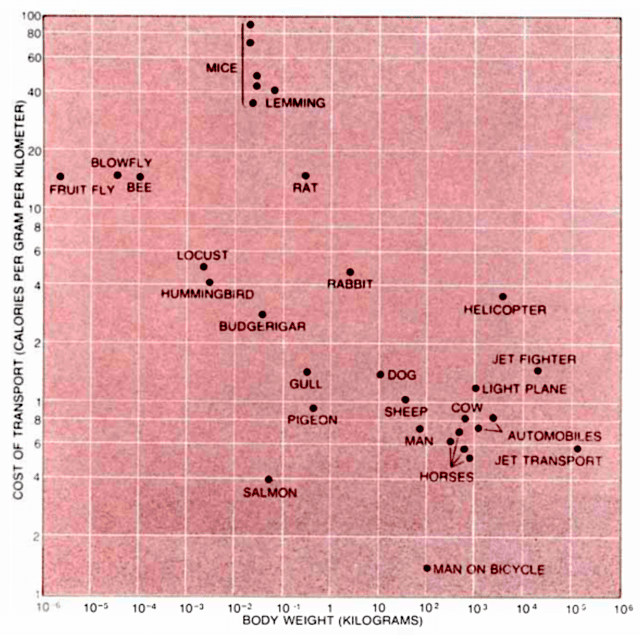
I think one of the things that really separates us from the high primates is that we're tool builders. I read a study that measured the efficiency of locomotion for various species on the planet. The condor used the least energy to move a kilometer. Humans came in with a rather unimpressive showing about a third of the way down the list. It was not too proud a showing for the crown of creation. So, that didn't look so good.
But then, somebody at Scientific American had the insight to test the efficiency of locomotion for a man on a bicycle. And, a man on a bicycle, a human on a bicycle, blew the condor away, completely off the top of the charts.
And that's what a computer is to me. What a computer is to me is it's the most remarkable tool that we've ever come up with.
It's the equivalent of a bicycle for our minds.
* * *
No one knows when or how we, the human species, started talking to each other. It is likely a natural progression from gesturing, but we can only speculate about it.
Language allowed us to break out of our brains and reveal the inner workings of our consciousness to others.

Source: Scott H. Young
Language is the vessel that carried us from the stone age through the agricultural revolution, the development of written language, the scientific and industrial revolutions, and now, the digital age.
Writing allowed us to offload memories to the physical world—outside of our brains. Through our collective and external memories, each generation has a head start on the previous one. Little by little, standing on the shoulders of taller and taller giants, we accumulate knowledge about ourselves and everything around us.
We've been for long using tools to help us think: notebooks help us calculate formulas, reason geometrically and preserve our ideas. With computers, our thinking is now occurring outside of our brains.
Computers are extensions of our minds in that they allow us to store, process, and retrieve information from them. With the advent of the internet we now have immediate access to not only almost all of the information ever produced by humankind but also to reproducible thinking encoded into these machines: algorithms.
Each of these processes—storing, processing and retrieving information—have concrete effects on the physical world: if I'm in Munich, saying "show route to Hamburg" to my phone will immediately show me the distance, ETAs and paths for different types of transport to reach my destination. Not only do I now suddenly know how to navigate across the country to reach another city, I'm also able to follow through the exact path via GPS—a sixth sense giving me perfect geolocation!
These things that we created—computers, and the internet—are literally rewiring our brains, right now, shaping how we think, and engage in social relationships, changing not only our individual selves but the societies we live in.
They started as mechanical machines that filled entire laboratories, turned into beige boxes in our homes and places of work, and are now sleek slabs of plastic, metal and glass in everyone's pockets. Step by step they get closer to our bodies, their interfaces more intuitive and natural.
The way we communicate with them is changing: before, we could only interact with them by speaking their language. We have now taught them ours. The torch of progress blazes on: it's a matter of time until they're connected directly with our brains—which is equally terrifying and awe-inspiring.

Brain-computer interfaces present a monumental scientific and engineering challenge, and brain-to-brain, a whole other category of difficulty.
First, we have no idea how information is encoded in the brain. That needs to be understood. Second, even assuming we're able to take a perfect snapshot of a piece of information in someone's brain—for example, how a particular movie scene makes them feel—we still need to be able to encode it in a way that includes the full context of their subjective experiences. Maybe the scene evokes unique memories of their childhood or is somehow entangled with the smell of a particular cinema's leather seats. Third, we need to figure out how to safely write this perfect snapshot into someone else's brain in a way that can be perceived identically.
Which is to say, it's a difficult problem. But a worthwhile one: imagine having the capability to suddenly become aware of answers for questions you just thought about. To expertly control truly integrated prosthetics giving you superhuman abilities. To give movement to the paralized, sound to the deaf, and sight to the blind.
What would be the impacts on society if we were able to communicate an order of magnitude more effectively? What if everyone was equipped with the same undisputed basic knowledge of history and science?
There are internal thoughts that we can attempt to describe with a thousand words, but ultimately fail to capture in a way that's precise, much less comprehensible by someone else. Words and sentences are an incomplete representation of our internal thoughts. In the same way that 3D objects cast 2D shadows (and 4D, 3D) communicating through language doesn't carry all of our cultural and developmental context—transmitting all of that along with every phrase would be impractical. Language is in this sense, lossily compressed thought.

Inert strings of words of ink and paper take a life of their own inside our heads. It's why the exact same information can be interpreted completely differently by different people.
Before language, fire and cooking technology allowed us to reallocate energy usage from the digestive system to the brain by outsourcing digestion to outside of our bodies, making macronutrients more efficiently absorbable. Almost all of a cooked meal is metabolized by the body, whereas raw foods yield less than half of their nutrients.
Cooking is an extension of our digestive system, and enabled us to develop large, calorie-hungry brains. It also gave us time to think: our primate cousins spend half of their days chewing raw food to consume enough calories to stay alive.
Brains can be seen as survival machines, locked inside dark skulls, constantly building a model of the outside world by predicting and learning through senses and memory. The biological human brain evolved to have the necessary sophistication to not only expertly navigate and understand the brute physical reality but also to construct social reality. Democracy, religion, money: all made up by us, for us.
We remember the past so that we can predict the future, and by doing so, we thrive.
We create technology, which functions as a non-biological extra layer to our brains and bodies, augmenting, complementing, and sometimes replacing our natural capabilities.
The wheel… is an extension of the foot.
The book… is an extension of the eye…
Clothing, an extension of the skin…
Electric circuitry, an extension of the central nervous system.
Relatively speaking, we are done evolving biologically. Further adaptations and enhancements to our bodies and minds will come through technology.

Check out "Neuralink and the Brain's Magical Future" for a very entertaining primer on the brain.
To be human is to have the ability to change the world around us. The shift from hunting and gathering to farming allowed us to spend less energy to acquire food while giving us a predictable calorie supply.
The resulting food surplus made it possible for populations to settle down and grow quickly while supporting people not being directly involved in the production of food—before agriculture that was everyone's job. For one, it allowed some to specialize and focus on developing better farming tools and more resistant crops, starting a vicious cycle of improvement and consumption that continues until today.
The transition from active foraging to a more sedentary lifestyle resulted in worse health for the general population. The average farmer worked harder than the average forager and got a worse diet in return. Our teeth, bones and joints became more fragile, and we became afflicted by novel diseases coming from newly domesticated animals, carriers of pathogens that incubated in our new densely populated cities.
Owning land suddenly became really important. Agriculture and the concept of private property reinforced each other and grew together, allowing us to create value and secure the fruits of our labor. It also created the circumstances for slavery to arise, and wars to be waged.
The groups of people growing the first crops could not have anticipated all of the collateral effects of their breakthrough. They just wanted more food.
If the past has taught us anything is that we have to be mindful of the consequences of our progress. In an increasingly connected world, change is often nonlinear and unpredictable. Cars didn't just replace horses—they forever changed the entire outlook of every city. Did Tim Berners-Lee anticipate his invention adding to forces pulling whole countries apart?
Our progress will continue to bring us previously unimaginable challenges. Against an unknowable future, it doesn't hurt to keep improving our capabilities to adapt and, more difficultly, to cooperate—especially at scale.

"Humanity" by Pawel Kuczynski
Computers are getting pretty good at driving cars—even in the most difficult situations—and can already instantly diagnose some diseases better than human doctors. Technology has a way to reveal the potential of our environment, and ourselves. We have to be careful not to look at what surrounds us as mere raw materials to be consumed for the purposes we conceive—sooner or later we'll start calling humans resources too...
It serves us well to leverage technology to give us time. Time to create and enjoy art, follow the trail of our curiosities and passions, be fully present with loved ones, or even just appreciate the freedom to idle and ponder about the inconsequential—the stuff that seems to make us, us.
We are born with incomplete brains that get imbued with language and the accumulated collective knowledge of our previous generation. Knowledge, roughly defined as a justified, true belief, doesn't fit the bill of much of the waves of man-made information hitting the shores of our eyes and ears these days. Acquiring it requires many things, and passively consuming content curated by profit-maximizing algorithms is not one of them.
We attempt to transfer our gathered knowledge to machines and we specify the rules for their learning, and by doing that we're inherently encoding our own biases and limitations in algorithms that will be making life-altering choices. Should your out-of-control self-driving car automatically swerve to avoid running over kids on the street, and by doing so put your own life at considerable risk? Should you be able to opt-out of this behavior with a checkbox?
We need to be careful about what we teach machines, and prevent them from making the same mistakes we do, because they will do them orders of magnitude more efficiently and at scale. Human judgment is both fallible and (still) indispensable, especially when the stakes are higher.
To be human is to have the ability to change oneself. Through open source and hardware hacking, people with type 1 diabetes—who need to continuously measure and manipulate their glucose and insulin levels to stay alive—took it upon themselves to build an artificial pancreas and hook it up to their own bodies. The technology they created not only removed an enormous cognitive burden from their lives but also decreased the likelihood of physical complications and increased their lifespans.
What wouldn't you give to free up a large part of your brain processing power and at the same time considerably improve all of your health indicators?
Empowered by knowledge and technology, they didn't have to wait for the world around them to change—they went ahead and changed it themselves. And in the process, they changed their lives.
Arunachalam Muruganantham, who grew up in poverty and dropped out of school at 14 to support his single mother, also didn't wait for the world around him to change. Going against conservative rural India—who treats sex education as taboo—he provided underpriviledged women with affordable sanitary pads by creating a set of pad-producing machines. Poor menstrual hygiene cause women to miss school, risk infections, and die from cervical cancer. The industry around his invention provides women with income, gives them dignity, and saves their lives.
Technology and the tools we create drastically accelerate our progress. Matt Taylor compellingly puts it in perspective in "Humanity 2.0". In it he presents the chart below, which seems to show life's steady and even progress from unicellular organisms to us, human beings, building artificial suns, taking pictures of black holes, and unlocking the mysteries of life itself.
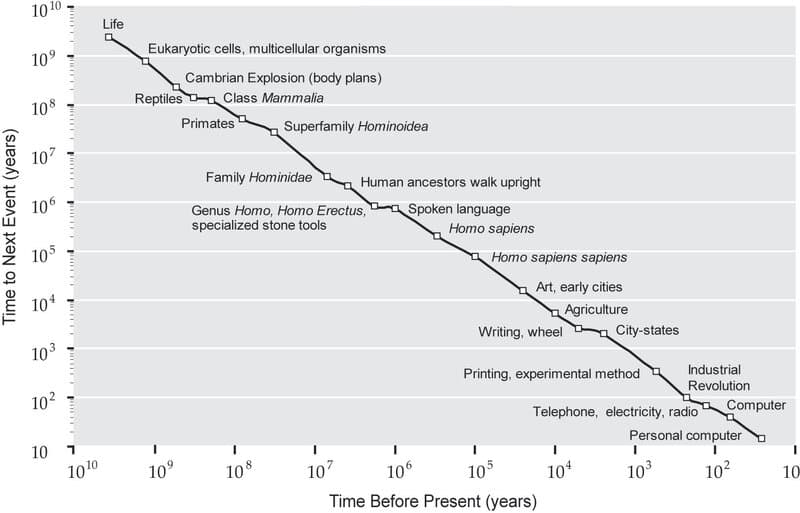
From The Singularity Is Near by Ray Kurzweil
The scale of this chart could be initially misleading: the visual distance between the birth of life and the first eukaryotic cells—2 billion years—is represented identically as the distance between the industrial revolution and the personal computer—200 years.
The chart below tells the same story on a scale more easily digestible by us.
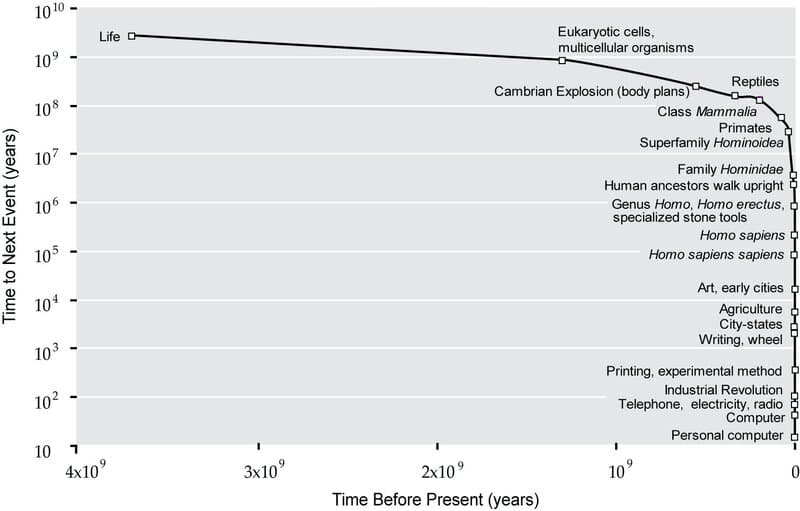
From The Singularity Is Near by Ray Kurzweil
The mostly horizontal line depicts the slow process of biological evolution, which eventually—out of only randomness and constraints—brought our neomammalian brains into existence, kick-starting the journey of fire and language towards modern civilization. It's been a long ride, and in the relative time scale of biology our evolution through technology is happening fast and only seems to be accelerating.
Each technological advance builds upon the last, creating a positive feedback loop of progress.

We shape our tools, and then our tools shape us.
— Marshall McLuhan
We are inevitably shaped by what we create, and fundamentally driven by our deeply human essence: the anticipation of discovery, the satisfaction of attainment, and the joy in relationships we cultivate along the way.
The technology we create will survive us, and its impact will be unevenly felt—the fruits of progress aren't unconditionally good. We've come a long way towards improving our lives, and we can still go so much further. There are so many problems to solve.
In these unprecedented times of tremendous individual potential, it's good to keep our values in check and constantly revisit the question: are we building the right things?
History is a metaphorical pathway, and just like physical ones, it's built purposefully by us, based on the topography and constraints of the environment. Unlike physical ones, it sometimes takes us by surprise.
The future is still not determined, and "the best way to predict it is to invent it". Informed by our knowledge and empowered by our technology, it is up to us to lay the bricks.
* * *
Now, back to work. What was I doing again? Oh yeah, let's open that file.
Thanks to Evan Lezar, Fabrício Nascimento, Helder Ribeiro, John Wiegley and Protesilaos Stavrou for reading and giving suggestions for drafts of parts of this.
Special thanks to Bozhidar Batsov, Hunter McClelland and Thorsten Ball for insightful, attentive and precise feedback.